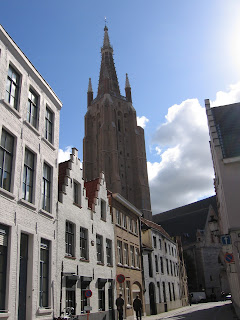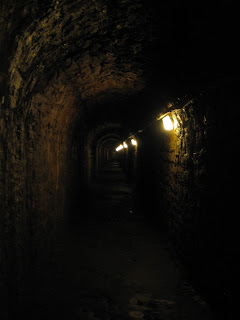Bruges (or locally ‘Brugge’) is the capital of West Flanders (‘Dutch’ speaking Belgium) and is arguably the tourist hub of Belgium and recently gained more attention being the setting for the film ‘In Bruges’. One week on from my trip with two friends to this sleepy medieval city, I uncover my unwatched copy of this film and as I read descriptions of guns, hit-men and the tag-line ‘Shoot first, sightsee later’, I can’t help but feel I missed out on the action somewhat, especially when I only did one of those things. However, this is not to say that my trip to the picturesque Flemish city was boring, unsatisfactory or without surprise.
Indeed, after changing from the Eurostar in Brussels (and its self-playing Grand Piano), to Bruges, our welcome was mixed. While I was made to feel at home by the unusual surprise of people playing cricket there, we were all unsettled when the taxi driver told us that the hostel I had booked was bankrupt and had been shut down. Once dropping us off, he then complained at us for making him, a taxi driver, bring us there (after taking the fare of course). It wasn’t the best start to our stay but fortunately there were no hiccups from then onwards. The hostel he was referring to was one the other side of town, although it had just come under new ownership, whom were very friendly, and so indeed is the city itself, one of the most welcoming I’ve been to in Europe; just make sure you don’t speak French however. Although basic, this quintessentially Flemish townhouse had a convivial, homely feel (with the steepest stairs I’ve ever used), situated in the medieval heart of the city.
Towering over Bruges’ romantic, narrow winding streets are several imposing churches, perhaps the most impressive being ‘Our Lady of Bruges’ which besides having one of the world’s largest brick towers, has many historical and artistic pieces including ‘Madonna and Child’, believed to be the Michelangelo’s only sculpture to leave Italy in his lifetime. Indeed, the historic centre (a UNESCO World Heritage Site) is a joy for those appreciative of medieval and gothic architecture and culture. This is before one discovers the canals, which just add the extra element of romance to the city; the veins to the heart of city, helping give the nickname, ‘Venice of the North’. Although now they are now just for tourist boats (which I would recommend in order to see the entire centre), they were once vital to the economy and the growth the city, once one of the most important in medieval Europe. As well as its charm, its great preservation allows one to experience a cultural walk back through the city’s history and its era of great power, with some superb museums to help accompany this experience.
One of the more unusual attractions is the world’s only chip museum, Frietmuseum, which peels back through time to present the history of the humble chip. Although occasionally surreal at times and a very niche subject area, it is worth a visit if not to sample the chips themselves. Choco-Story follows in a similar, but chocolaty, manner, although it is probably better value for money, with a live demonstration and chocolate sculptures. The legendary taste of Belgian chocolate is easily to discover thanks to the numerous chocolate shops, as well as several beer shops, located around the ‘hub’ of the city, the Markt.
This square is the buzzing heart of the city, overlooked by an 83 metre high medieval bell tower, known as the Belfry. Also situated inside the city’s most iconic landmark are cultural exhibitions, including the works of Salvador Dali. This is an indication of a newer, modern dimension to Bruges, as a bustling, cultural centre for the arts and music, just waiting to be discovered. Bruges has an obvious romantic charm, with its winding medieval streets and canals, but this old, traditional city is also ready to accommodate the new, offering several attributes which will appeal to any type of traveller.


















